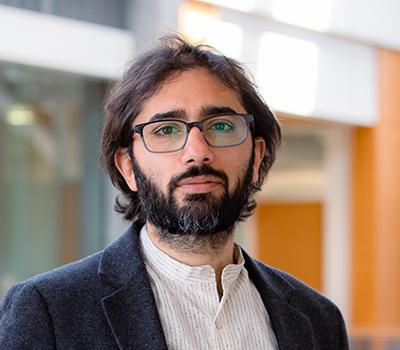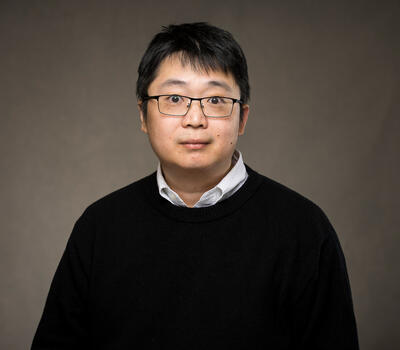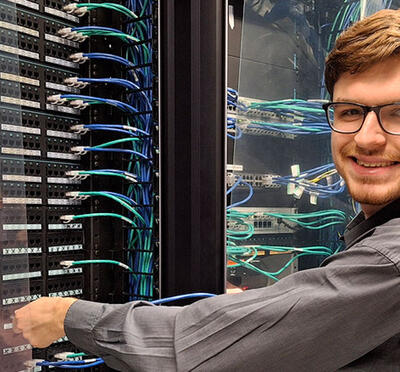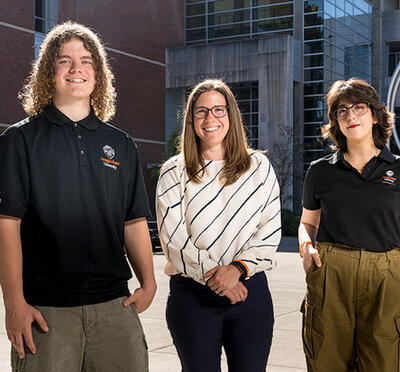Four faculty in the Oregon State University College of Engineering have received prestigious early-career investigator awards from the National Science Foundation and the Department of Energy. Houssam Abbas, Yue Cao, and Xiao Fu are the recipients of the Faculty Early Career Development, or CAREER, awards from the NSF. Kelsey Stoerzinger is the recipient of an award from DOE’s Early Career Research Program.
The grants cover a wide array of engineering projects: developing computational ethics for autonomous systems; incorporating currently overlooked “virtual” resources, such as HVAC systems or water heaters, into energy storage systems; advancing unsupervised deep representation learning, and designing and testing catalysts that facilitate the conversion of nitrate into ammonia more efficiently and sustainably than current methods.
“These early career awards demonstrate the importance of our research and how the College of Engineering continues to innovate and lead in so many fields,” said Scott Ashford, Kearney Dean of Engineering. “On a personal note, I couldn’t be happier for these faculty members.”
Increasingly, autonomous systems — such as self-driving cars, unpiloted aerial vehicles, and assistive robots in medical facilities — interact with people on a daily basis. Houssam Abbas, assistant professor of electrical and computer engineering, will use his five-year, nearly $500,000 NSF CAREER award to further develop computational ethics as an engineering and scientific discipline to be used in the design of such systems.
For example, a self-driving car may encounter a situation where it needs to make an ethically laden decision: Given no other choice, does it run into a wall and potentially injure its passengers, or run into a pedestrian? While this question cannot be resolved with purely technical solutions, there is an urgent need for an engineering process to model, verify, and analyze autonomous systems’ behaviors in such situations.
Abbas aims to develop engineering tools to allow system designers to formalize, program, and verify the implementation of ethical principles.

Traditional energy storage systems encompass what Yue Cao, assistant professor of electrical and computer engineering, calls “real” storage, which includes batteries, supercapacitors, and fuel cells. He plans to use his five-year, $500,000 NSF CAREER award to figure out ways to also incorporate currently overlooked “virtual” resources, such as HVAC systems or water heaters.
“I call those systems ‘virtual,’ because storing energy is not their primary purpose, but they consume electricity and are tied to the grid or other energy resources,” Cao said.

The purpose of Cao’s research will be to create a universal equivalent circuit for multiple energy storage systems that are controlled by connected power electronics. Cao will then develop a design approach to optimally size the hybrid energy storage systems and increase their life and reliability. By dynamically regulating virtual energy mass, this new approach aims to modulate energy usage from the grid.
“For example, if I have rooftop solar panels on my house, and it’s a sunny day and the air conditioner is on, and in the next minute a cloud blocks the sun, solar power will be reduced,” Cao said. “Current systems would use power from the grid to keep the air conditioner running. With an integrated energy system, however, the power used by the air conditioner, or the virtual resource, could be adjusted temporarily to match the reduced power of the solar panels, without my noticing a difference in temperature.”
Cao is already working on research projects that involve energy storage problems including fast charging stations for heavy-duty trucks on rural highways, electrification of locomotives, and wave energy.
Xiao Fu, assistant professor of electrical and computer engineering and artificial intelligence, will use his five-year, $500,000 NSF CAREER award to develop a suite of nonlinear factor analysis tools and contribute to a deeper understanding of unsupervised machine learning and sensing systems.

Factor analysis tools are cornerstones of many sensing and learning applications, such as document analytics, hyperspectral imaging, brain signal processing, and representation learning. They’re designed to detect meaningful information hidden in large data sets, such as prominent topics within a large collection of documents.
However, many classic factor analysis models can be thwarted by phenomena known as nonlinear distortions, which frequently cause inaccurate results. To address the problem, Fu must first establish a deeper theoretical understanding of the so-called nonlinear factor analysis models, which are not well understood.
One of his goals is to use nonlinear factor analysis to understand and advance unsupervised deep representation learning, which is considered a critical tool to alleviate the high demand for labeled data in modern AI systems.
Supervised machine learning algorithms learn through exposure to labeled inputs that correspond with specific outputs. But the training process can be costly and time intensive, because reliable data annotation must be done by experienced workers.
Fu hopes to “reverse engineer” the data generating/acquisition process, so that machine learning and sensing algorithms can recognize and categorize unlabeled data — images, for instance — without being trained, by identifying and interpreting essential factors hidden within the data.
Kelsey Stoerzinger, assistant professor of chemical engineering, plans to use her five-year, $750,000 early career award from the DOE to develop a deeper understanding of electrochemical processes used to convert nitrate into ammonia, and to design and test catalysts that target this reaction.

Ammonia is among the most widely used chemicals in the world. But industrial-scale ammonia production relies on the Haber-Bosch process, in which hydrogen and nitrogen are combined at high temperatures and pressures. The practice requires enormous amounts of energy and produces huge volumes of carbon dioxide.
Meanwhile, nitrate from untreated wastewater and agricultural runoff overwhelms streams, rivers, and groundwater in many areas of the country. Ingesting excessive nitrate has been linked to a number of serious health risks in humans, while an overabundance in aquatic ecosystems can devastate plant and animal life.
Stoerzinger, who won an early career award from the National Science Foundation in 2021, will investigate an electrochemical option for ammonia synthesis in which an electric current is passed through a device containing nitrate-contaminated water. “We want to take this waste nitrate and transform it into a usable form, ammonia, and we’ll do that by applying electricity from renewable energy sources,” she said.
However, widespread implementation of an electrochemical approach will be feasible only with catalysts that select for, or favor, the reaction that produces ammonia rather than a competing reaction that produces hydrogen from the water molecules. Competing reactions can occur when the same starting materials combine to create undesired products.
Stoerzinger’s goal is to identify effective catalytic materials that result in high yields of ammonia. She intends to focus on materials made from abundant elements, like nickel, iron, and cobalt, because precious metal catalysts, while potentially useful, are too expensive for large-scale production.
“We want to find sustainable solutions that allow us to recycle nitrate by upgrading it to something valuable,” Stoerzinger said. “Developing the most selective and efficient catalysts is the linchpin that will allow us to move the technology forward.”






